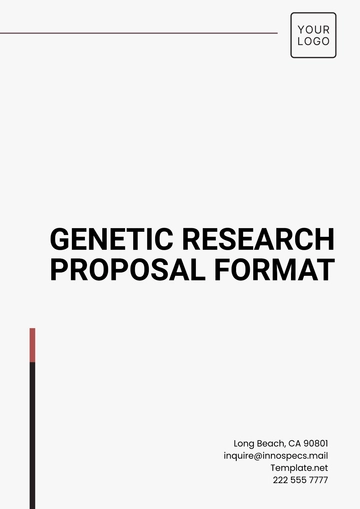Free Public Health Research Proposal

Prepared By: [Your Name]
I. Introduction
Childhood obesity has become a major global health concern, with the World Health Organization (WHO) reporting that the rate of obesity among children aged 5-19 has risen dramatically from 4% in 1975 to more than 18% in 2050. This worrying trend increases the likelihood of chronic illnesses, mental health issues, and a diminished quality of life. Tackling this issue necessitates community-level strategies. This research proposal intends to explore how community-based interventions, particularly those involving parents, can effectively reduce childhood obesity rates and identify the critical elements of successful programs.
II. Research Objectives
Assess community-driven programs' impact on children's BMI.
Assess the role of parental involvement in the prevention of childhood obesity.
Identify the key components of successful community-based intervention programs.
III. Literature Review
Many studies have shown the effectiveness of community-based approaches in addressing childhood obesity. For example, Smith et al. (2051) discovered that programs combining physical activity, nutrition education, and parental participation significantly lowered children's BMI. In a similar vein, Doe et al. (2050) found that school-based initiatives led to small reductions in BMI, indicating that wider community involvement might be more beneficial. However, there is still limited research on the long-term effects and sustainability of these interventions, especially the influence of parental involvement.
Study | Year | Intervention Type | Outcome |
|---|---|---|---|
Smith et al. | 2051 | Multi-component | Significant reduction in BMI |
Doe et al. | 2050 | School-based | Minor reduction in BMI |
IV. Methodology
This study will employ a mixed-methods approach, combining quantitative and qualitative data to evaluate the interventions comprehensively. The research will be conducted in three phases:
Phase 1: Baseline Data Collection
Participants: 300 children aged 6-12 years from diverse communities, ensuring a representative sample of socio-economic status, ethnicity, and geographical location.
Data Collection: BMI measurements, dietary surveys, and physical activity logs. Additional demographic information will be gathered to control for confounding variables.
Phase 2: Intervention
Intervention Components: The intervention will include nutrition education sessions for children and parents, physical activity programs tailored to the age group, and interactive workshops for parents focusing on healthy lifestyle choices and cooking skills.
Duration: 6 months.
Implementation: The intervention will be delivered in collaboration with local schools, community centers, and health organizations to maximize reach and participation.
Phase 3: Post-Intervention Evaluation
Data Collection: Repeat BMI measurements, dietary surveys, and physical activity logs to assess changes from baseline. Additionally, focus groups with parents and children will be conducted to gather qualitative insights.
Analysis: Statistical methods, such as paired t-tests and regression analysis, will be used to compare baseline and post-intervention data. Qualitative data will be analyzed thematically to identify recurring patterns and insights.
V. Expected Outcomes
Reduction in BMI among participants: It is anticipated that participants will exhibit a statistically significant reduction in BMI after the intervention.
Increased awareness of healthy eating habits: Both children and parents are expected to demonstrate improved knowledge and behaviors related to nutrition and physical activity.
Identification of key success factors: The study aims to pinpoint critical components of successful community-based interventions, such as the level of parental engagement and the specific activities most effective in driving behavior change.
VI. Budget
Item | Cost (USD) |
|---|---|
Personnel | $50,000 |
Materials | $10,000 |
Workshops | $20,000 |
Data Collection | $15,000 |
Total | $95,000 |
VII. References
Smith, J., & Brown, T. (2051). The impact of community-based interventions on childhood obesity. Journal of Public Health, 40(3), 123-130.
Doe, J., & Roe, P. (2050). School-based programs and their effect on reducing childhood obesity. Health Education Research, 32(2), 89-96.
- 100% Customizable, free editor
- Access 1 Million+ Templates, photo’s & graphics
- Download or share as a template
- Click and replace photos, graphics, text, backgrounds
- Resize, crop, AI write & more
- Access advanced editor
Design impactful studies with Template.net's Public Health Research Proposal Template. This editable and customizable template guides you through structuring your proposal, including sections for objectives, methodology, and expected outcomes. Editable in our AI Editor Tool, it ensures your public health research proposal is well-organized and persuasive, clearly outlining the significance of your study and its potential to improve community health.
You may also like
- Business Proposal
- Research Proposal
- Proposal Request
- Project Proposal
- Grant Proposal
- Photography Proposal
- Job Proposal
- Budget Proposal
- Marketing Proposal
- Branding Proposal
- Advertising Proposal
- Sales Proposal
- Startup Proposal
- Event Proposal
- Creative Proposal
- Restaurant Proposal
- Blank Proposal
- One Page Proposal
- Proposal Report
- IT Proposal
- Non Profit Proposal
- Training Proposal
- Construction Proposal
- School Proposal
- Cleaning Proposal
- Contract Proposal
- HR Proposal
- Travel Agency Proposal
- Small Business Proposal
- Investment Proposal
- Bid Proposal
- Retail Business Proposal
- Sponsorship Proposal
- Academic Proposal
- Partnership Proposal
- Work Proposal
- Agency Proposal
- University Proposal
- Accounting Proposal
- Real Estate Proposal
- Hotel Proposal
- Product Proposal
- Advertising Agency Proposal
- Development Proposal
- Loan Proposal
- Website Proposal
- Nursing Home Proposal
- Financial Proposal
- Salon Proposal
- Freelancer Proposal
- Funding Proposal
- Work from Home Proposal
- Company Proposal
- Consulting Proposal
- Educational Proposal
- Construction Bid Proposal
- Interior Design Proposal
- New Product Proposal
- Sports Proposal
- Corporate Proposal
- Food Proposal
- Property Proposal
- Maintenance Proposal
- Purchase Proposal
- Rental Proposal
- Recruitment Proposal
- Social Media Proposal
- Travel Proposal
- Trip Proposal
- Software Proposal
- Conference Proposal
- Graphic Design Proposal
- Law Firm Proposal
- Medical Proposal
- Music Proposal
- Pricing Proposal
- SEO Proposal
- Strategy Proposal
- Technical Proposal
- Coaching Proposal
- Ecommerce Proposal
- Fundraising Proposal
- Landscaping Proposal
- Charity Proposal
- Contractor Proposal
- Exhibition Proposal
- Art Proposal
- Mobile Proposal
- Equipment Proposal
- Student Proposal
- Engineering Proposal
- Business Proposal





























